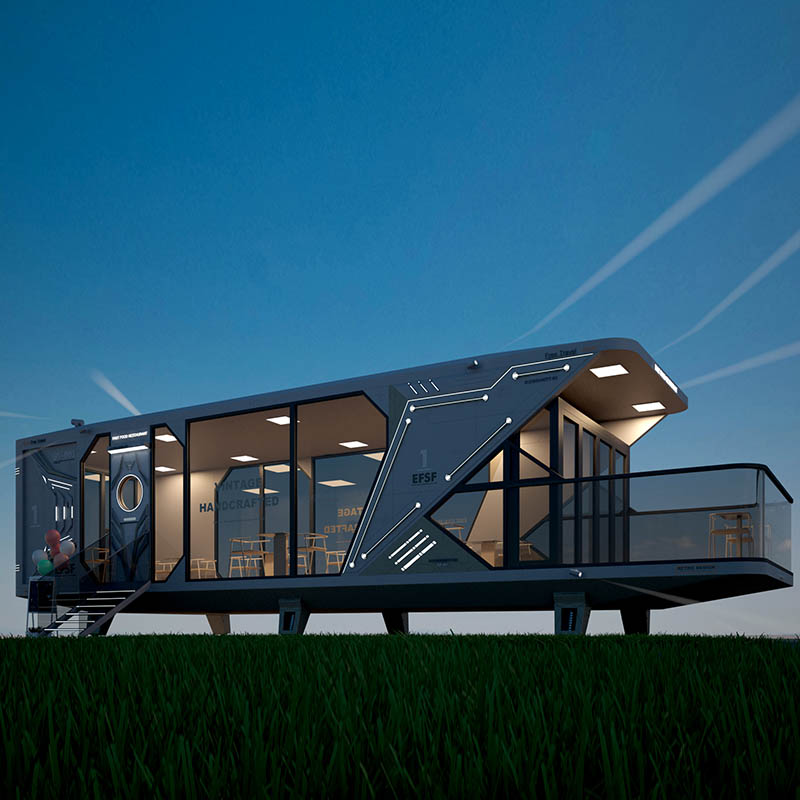Why Are Capsule Houses Becoming a Popular Solution for Modern Living Challenges?
2025-02-20
In an era where urbanization is accelerating, housing costs are soaring, and environmental concerns are growing, the way we think about living spaces is evolving. One solution that has gained attention globally is the concept of capsule houses. But what makes these compact, efficient homes so appealing, and could they really be the future of housing?
What Is a Capsule House?
A capsule house is a compact, modular living space designed to maximize functionality within a small area. These houses often feature minimalist designs, with a focus on efficient use of space and essential living needs. Originating in Japan, the concept has spread worldwide, appealing to those who value affordability, sustainability, and simplicity.
Unlike traditional homes, capsule houses often prioritize modular construction, meaning they can be prefabricated off-site and easily transported to the desired location. This adaptability makes them a flexible housing solution for a wide range of needs, from temporary housing to permanent residences.
Why Are Capsule Houses Gaining Popularity?
There are several reasons why capsule houses are becoming a sought-after option for modern living:
1. Affordability:
In many cities, owning or renting a traditional home has become prohibitively expensive. Capsule houses offer a cost-effective alternative, providing the essentials of a home at a fraction of the price.
2. Space Efficiency:
Capsule houses are designed to maximize every inch of space. With features like foldable furniture, hidden storage compartments, and multi-functional areas, these homes make small living feel spacious and organized.
3. Sustainability:
As environmental concerns grow, many capsule houses are built with eco-friendly materials and energy-efficient designs. Their smaller size also means reduced energy consumption, making them a sustainable housing choice.
4. Flexibility:
Capsule houses are often modular and easy to relocate, making them ideal for those who value mobility or want to adapt their living space to changing needs.
5. Urban Solutions:
In densely populated cities where land is scarce, capsule houses provide a way to address housing shortages without requiring large plots of land.
What Are the Key Features of a Capsule House?
Capsule houses are known for their unique design elements that prioritize functionality and comfort. Common features include:
- Compact Living Areas: The interiors are designed to include only essential spaces, such as a sleeping area, kitchenette, bathroom, and small living or work area.
- Smart Storage Solutions: Hidden compartments, wall-mounted shelves, and under-bed storage help maximize the use of space.
- Prefabrication: Many capsule houses are built off-site in factories, reducing construction time and cost.
- Eco-Friendly Materials: Sustainable materials such as recycled wood or energy-efficient windows are often used.
- Minimalist Aesthetics: Clean lines and simple designs create a calming, uncluttered environment.
Who Benefits Most from Capsule Houses?
Capsule houses appeal to a wide variety of people, including:
1. Urban Dwellers: For individuals living in expensive cities, capsule houses provide an affordable way to live close to work and city amenities.
2. Minimalists: Those who value simplicity and living with fewer possessions are drawn to the pared-down lifestyle offered by capsule houses.
3. Eco-Conscious Individuals: Capsule houses align with the values of people looking to reduce their carbon footprint and live more sustainably.
4. Travelers and Remote Workers: Capsule houses can be used as mobile or temporary housing for people who frequently move for work or leisure.
5. Governments and NGOs: Capsule houses are increasingly being used for disaster relief or to address homelessness, thanks to their affordability and quick setup.
Are There Any Challenges with Capsule Houses?
While capsule houses have many advantages, they are not without challenges. Some of the potential downsides include:
- Limited Space: Living in a capsule house requires a significant adjustment, especially for those used to larger homes.
- Zoning Laws and Regulations: In some areas, building and installing capsule houses may face legal or bureaucratic hurdles.
- Longevity: Depending on the materials used, some capsule houses may not be as durable as traditional homes.
- Social Stigma: In some cultures, smaller homes may be seen as a sign of lower status, which could discourage adoption.
Why Could Capsule Houses Be the Future of Housing?
As global populations rise and urban areas become more crowded, innovative housing solutions like capsule houses offer a glimpse into the future of living. Their affordability, adaptability, and sustainability make them an attractive option for tackling housing crises, reducing environmental impact, and creating functional, modern living spaces.
Moreover, capsule houses reflect a cultural shift towards valuing experiences over possessions. For many, the idea of owning a large home filled with unnecessary items is being replaced by a desire for mobility, efficiency, and environmental responsibility.
Conclusion
Capsule houses are more than just a trend—they represent a new way of thinking about how we live and interact with our surroundings. By addressing modern challenges like affordability, sustainability, and urbanization, these compact homes could play a key role in shaping the future of housing.



